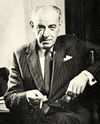The Mischief Makers (novel)
Authors [about]:
join in to develop this article! |
The Mischief Makers is a 1982 suspense novel by the British author William Haggard published in England by Cassell and in the United States by Walker and Company. It was Haggard's 21st novel involving his protagonist Colonel Charles Russell, who had been head of the unobtrusive but lethal Security Executive, a government counter-intelligence agency, for the first 11 books in the series and then is frequently consulted by his various successors during his retirement. Like most of the other works by Haggard and some by his near contemporaries Victor Canning and Michael Gilbert, it is both a standard novel of suspense and a semi-political thriller about the reactions of those in the high government positions who scent potential danger to their own political standing from the on-going events of the novel.
Plot
Protagonist is perhaps too strong a word to describe Colonel Russell. As Haggard himself wrote about his fiction:
My novels are chiefly novels of suspense with a background of international politics. A Colonel Charles Russell of the Security Executive, a not entirely imaginary British counter-espionage organization, while not a protagonist in the technical sense, holds the story line together in the background by his operations, while the characters in the foreground carry the action."[1]
This is certainly the case with The Mischief Makers. Written with Haggard's usual spare, dry, and understated style, it is told through the viewpoints of a number of diverse characters and only infrequently do we see Colonel Russell directly. The elderly Berber president of an unnamed North African country—not Arab, for he detests Arabs—concocts a hair-brained scheme to avenge a decades-old rape of one of his daughters by a long-since dead Englishman serving in the French Foreign Legion. He entrusts the scheme—the instigation of armed and violent race riots by supposedly oppressed blacks in British cities—to one of his sons, who is both a diplomat and the head of the country's secret service. Reluctantly but obediently Abdel duly smuggles various arms into England via the diplomatic bag and then seeks to find enough disaffected blacks throughout the country to use them in an uprising.
Refers often to the Bristol riot of 1980, which would have happened the previous year in terms of the book, I guess. WP calls this the 1980 St. Pauls riot, with no period after the St.
References
- ↑ From the back flap of the dust jacket of the Walker and Company American edition of The Conspirators, New York, 1967
